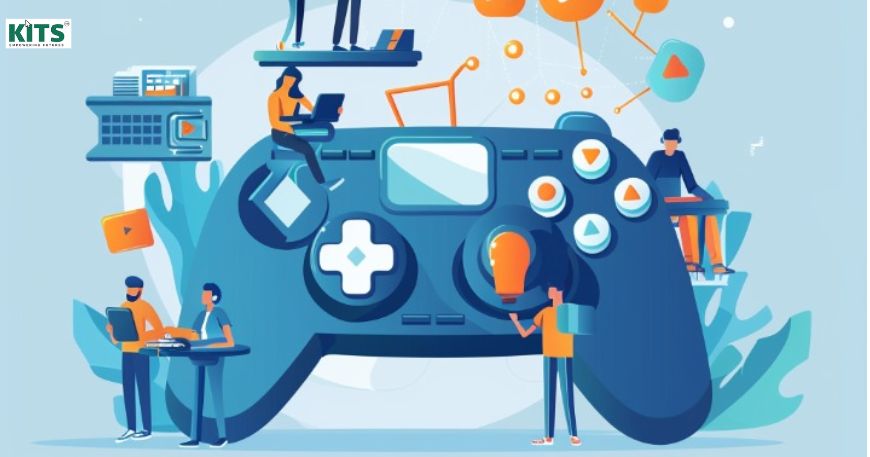Start your journey to become a game developer with our comprehensive courses. Learn essential skills, master game engines, and build your portfolio to kickstart a successful career in the gaming industry.
Introduction
Are you enthusiastic about recreation and interested in turning that energy into a career? Have you ever envisioned making you possess a virtual world? Getting to be a game developer is an exciting way that mixes inventiveness, specialized ability, and an enthusiasm for gaming. But where do you begin?
In this guide, we’ll unravel the essential knowledge and skills you need to embark on your game development journey. From understanding core programming languages to mastering game design principles, we’ll also explore what you need to know to become a game developer, from the essential skills and education to the best practices in the industry.
So, whether you’re a seasoned coder or a gaming enthusiast looking to leap, join us as we explore the exciting world of game development.
Are you ready to level up your career? Let’s begin!
What is a Game Developer?
A game developer is a key figure in the video game industry, responsible for crafting engaging and interactive gaming experiences. These professionals translate designs, storyboards, and ideas from game designers into playable games.
In essence, game developers are creative experts who design, build, and implement video games. They possess expertise in programming languages and software tools required to bring game concepts to life. Working closely with artists, designers, and producers, game developers create immersive experiences for various platforms, including consoles, PCs, and mobile devices. Their tasks include coding game mechanics, user interfaces, and artificial intelligence, ensuring seamless gameplay and compelling storytelling. Additionally, game developers optimize performance and troubleshoot issues to provide players with enjoyable and captivating gaming experiences worldwide.
What Does a Game Developer Do?
Designing, developing, and implementing video games across multiple platforms are the core responsibilities of a game developer. Their role involves a diverse range of tasks and expertise:
Conceptualization and Design:
- Work with game designers to turn game ideas into technical plans and specifications.
- Develop game mechanics, rules, and narratives that align with the overall vision of the game.
Programming:
- Write and debug code using languages like C++, C#, or Java to create features such as gameplay mechanics, user interfaces, and artificial intelligence (AI).
- Use game development frameworks and engines (e.g., Unity, Unreal Engine) to build interactive environments and ensure smooth gameplay.
Art and Audio Integration:
- Incorporate artwork, animations, and audio elements into the game engine, collaborating with artists, animators, and sound designers to achieve a cohesive visual and auditory experience.
Testing and Optimization:
- Perform thorough testing to identify and resolve bugs, glitches, and performance issues affecting gameplay quality.
- Optimize game performance by refining code, assets, and resources to improve speed, efficiency, and user experience.
Collaboration and Project Management:
- Partner with cross-functional teams including designers, artists, producers, and testers throughout the development process.
- Adhere to project timelines and milestones to ensure timely delivery and final release.
Continuous Learning and Innovation:
- Keep up with industry trends, emerging technologies, and best practices in game development.
- Experiment with new gameplay mechanics, technologies, and storytelling techniques to create distinctive and engaging player experiences.
Deployment and Support:
- Launch games on various platforms, such as PC, consoles (e.g., PlayStation, Xbox), and mobile devices (iOS, Android).
- Provide ongoing post-launch support, including updates, patches, and addressing player feedback and issues.
Game developers are integral to bringing imaginative worlds and interactive experiences to life, merging technical skills with creativity to captivate and entertain players worldwide.
Tools and Technologies:
Unity: Chosen by 39% of game developers worldwide, Unity stands out for its cross-platform capabilities and comprehensive asset store.
Unreal Engine: Favored by 28% of developers, Unreal Engine excels with its high-fidelity graphics and powerful development environment.
C++ and C#: These programming languages are essential in game development, offering both exceptional performance and flexibility.
Functions and Responsibilities of a Video Game Developer
The specific duties of a game developer can vary significantly based on the company’s size and your area of expertise. Larger game studios often have specialized roles focused on specific areas of game development. Conversely, at a smaller publisher, you might take on a broader range of tasks throughout the game’s lifecycle.
Here are some common daily responsibilities of a game developer:
- Innovate Game Design: Develop and pitch new ideas for game concepts and features.
- Code Visual Concepts: Translate visual designs and concepts into functional code.
- Prototype and Improve Gameplay: Create prototypes, refine gameplay mechanics, and enhance overall game quality.
- Collaborate Across Teams: Work closely with designers, producers, artists, and quality analysts to ensure cohesive development.
- Ensure Platform Stability: Test and ensure the game operates smoothly across various platforms.
- Review and Improve Code: Examine existing code for potential enhancements and optimizations.
- Adapt Games for Different Systems: Modify games or their components to fit different systems and platforms.
Master Programming Fundamentals
Begin with the basics of programming languages and concepts:
- Languages: Start with versatile languages such as Python and C++, which are commonly used in game development.
- Data Structures & Algorithms: Gain a solid understanding of crucial data structures (like arrays and linked lists) and algorithms (such as sorting and searching) necessary for efficient game coding.
Grasp Mathematics for Games
Explore mathematical principles essential for game development:
- Linear Algebra: Focus on vectors, matrices, and transformations, which are fundamental for 3D graphics and game physics.
- Geometry: Study geometric primitives, intersections, and spatial algorithms to handle game environments and collisions effectively.
Learn Game Design Principles
Gain a solid understanding of game design and mechanics:
- Game Architecture: Explore game loops, states, and design patterns to structure game logic effectively.
- User Interface (UI) Design: Create intuitive interfaces and user experiences to enhance player immersion and gameplay.
Master Computer Graphics and Rendering
Delve into the principles of computer graphics for visual effects:
- Graphics APIs: Learn about OpenGL and DirectX for rendering 3D graphics and optimizing performance.
- Shaders: Study shader programming to achieve realistic lighting, textures, and visual effects in games.
Implement Game Artificial Intelligence (AI)
Develop intelligent behaviors and decision-making processes:
- Pathfinding Algorithms: Understand algorithms like A* and navigation meshes for efficient character movement.
- Behavior Trees: Utilize hierarchical state machines and behavior trees to design complex AI interactions.
Build Games and Projects
Put your skills into practice by creating and completing game projects:
- Start Small: Begin with simple games to implement mechanics and grasp player interactions.
- Expand Complexity: Tackle more ambitious projects to demonstrate your expertise in game design and development.
Specialize and Deepen Your Knowledge
Select a specialization within game development:
- Graphics Programming: Concentrate on rendering techniques, shaders, and performance optimization.
- Gameplay Programming: Focus on AI development, physics simulations, and multiplayer networking.
Education and Training
To start a career in game development, you typically need a background in computer science or a related field. Many aspiring game developers pursue a degree in game design or a software engineering diploma. Additionally, online courses and bootcamps focused on game programming can provide valuable skills and knowledge.
Key Skills for Game Developers
To excel as a game developer, you should master several key skills, including:
- Programming Languages: Proficiency in languages such as C++, C#, and JavaScript is crucial. These languages are commonly used in game development to create complex game logic and functionalities.
- Game Design Principles: Understanding the fundamentals of game design is essential for creating engaging and interactive experiences.
- Problem-Solving Abilities: Game development often involves troubleshooting and optimizing code to ensure smooth gameplay.
Build a Portfolio and Collaborate
Showcase Your Talent and Connect with the Game Development Community:
- GitHub: Create and maintain a portfolio on GitHub to showcase your code, projects, and contributions to open-source game development.
- Game Jams: Join game jams to test your abilities, connect with other developers, and produce creative game prototypes.
Networking and Industry Experience
Connecting with other professionals in the game development industry can open doors to job opportunities and collaborations. Attend gaming conferences, join online communities, and participate in game jams to build your network and gain industry insights.
Staying Updated with Industry Trends
The gaming industry is a dynamic field constantly evolving with new technologies and trends. Stay informed about the latest advancements in game development tools, such as Unreal Engine and Unity, to keep your skills relevant and up-to-date.
Seeking Job Opportunities
Once you’ve built your skills and portfolio, start looking for job opportunities in the game development field. Consider applying for positions such as game programmer, game designer, or software engineer within gaming companies or as a freelance developer.
Advantages of Being a Game Developer
Here are some key benefits of pursuing a career as a game developer:
- Creative Expression: Game development offers immense creative freedom, allowing developers to construct intricate worlds, captivating stories, and innovative gameplay experiences. It offers a platform to explore artistic visions and create interactive experiences that captivate players.
- Booming Industry: The gaming sector is experiencing tremendous growth, with the global market valued at approximately $162.3 billion in 2020 and projected to exceed $287.1 billion by 2026. This expansion presents substantial career opportunities and potential for advancement in the field.
- Global Reach and Impact: Video games cross geographical boundaries, reaching millions of players around the world. This global reach offers developers a chance to influence cultures, share stories, and entertain diverse audiences, contributing to broader social and cultural dialogues.
- Continuous Learning and Innovation: Being at the cutting edge of technological advancements, game development demands ongoing learning and adaptation. Developers frequently engage with the latest innovations in graphics, AI, and gameplay mechanics, fostering a culture of perpetual growth and skill enhancement.
Conclusion
Embarking on a career in game development demands a blend of analysis, networking, continuous learning, and above all, persistence. This guide provides a comprehensive roadmap for progressing towards your goal.
The article outlines essential skills, common roles, and salary expectations in game development. Aspiring developers should begin by building simple games using relevant software and showcasing their coding skills with screenshots from mobile or console games. This approach helps establish credibility as a skilled video game programmer for potential recruiters.
With a determined mindset and a portfolio showcasing your technical expertise, a successful career in game development is within reach for any motivated individual.
By understanding the role, acquiring the necessary skills, building a strong portfolio, and staying engaged with the industry, you can set yourself on a successful path in the exciting world of game development.
For more information and resources on how to become a game developer, visit the Kyaas Institute of Technical Skills (KITS), where we offer a range of courses and training programs to help you achieve your career goals.



